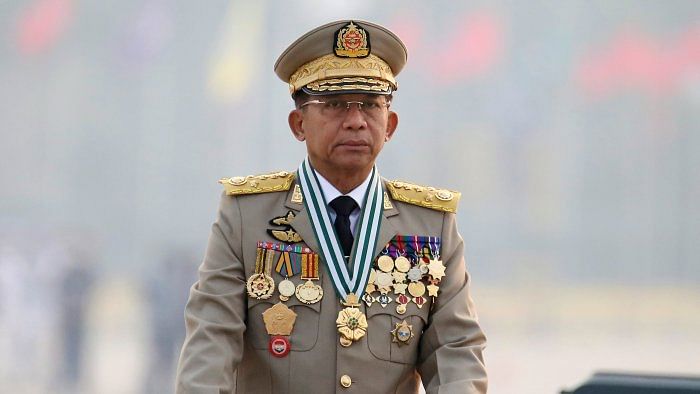
A Japanese journalist detained in Myanmar has been charged with breaching immigration law and encouraging dissent against the military, the ruling junta said Thursday.
Myanmar's military has clamped down on press freedoms since its coup last year, arresting reporters and photographers as well as revoking broadcasting licences as the country plunged into chaos.
Toru Kubota, who was held while covering a protest in Yangon last week, "has been charged under section 505 (a) and under immigration law 13-1", the junta said in a statement.
505 (a) -- a law that criminalises encouraging dissent against the military and carries a maximum three-year jail term -- has been widely used in the crackdown on dissent.
Breaching immigration law 13-1 carries a maximum penalty of five years in prison.
Filmmaker Kubota, 26, was detained near an anti-government rally in Yangon along with two Myanmar citizens.
After the charges were filed, he was transferred from police custody to Yangon's Insein prison, a security source told AFP, requesting anonymity.
"He's in good health and embassy officials have visited him already at the police station where he has been detained."
According to a profile on FilmFreeway, Kubota has previously made documentaries on Myanmar's Muslim Rohingya minority and "refugees and ethnic issues in Myanmar".
He is the fifth foreign journalist detained in Myanmar, after US citizens Nathan Maung and Danny Fenster, Robert Bociaga of Poland and Yuki Kitazumi of Japan, who were all eventually freed and deported.
Fenster, who was held in May last year as he attempted to leave the country, faced a closed-door trial inside Insein on charges of unlawful association, incitement against the military and breaching visa rules.
He was sentenced to 11 years in prison before being pardoned and deported.
"The regime has declared war on journalists, and 505a is its preferred charge," said Richard Horsey of the International Crisis Group.
"This charge against a Japanese journalist shows the regime is determined to continue stifling objective reporting, whether by local or foreign journalists."
Japan's foreign ministry said in a statement that its embassy in Myanmar was "appealing to the Myanmar authorities for the early release of the Japanese man, and will continue to make efforts to gather information and request his early release".
Tokyo is a top donor to Myanmar and has long-standing relations with the country's military.
The already isolated junta stoked further international outrage last week when it announced the execution of four prisoners, in the country's first use of capital punishment in decades.
"The situation in Burma has gone from bad to worse," United States Secretary of State Antony Blinken said, using the country's former name, after talks with EU foreign policy chief Josep Borrell.
Blinken met Borrell on the sidelines of a meeting of Southeast Asian foreign ministers in Cambodia, from which Myanmar's top diplomat has been excluded over the junta's failure to open talks with its political opponents.
More than 2,100 people have been killed in the crackdown on dissent in Myanmar and almost 15,000 arrested, according to a local monitoring group.
As of March this year, 48 journalists remain in custody across the country, according to monitoring group Reporting ASEAN.
Only China jailed more reporters than Myanmar last year, according to the Committee to Protect Journalists.